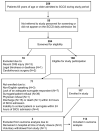Outcomes Associated With Delirium in Older Patients in Surgical ICUs
- PMID: 19017895
- PMCID: PMC2963095
- DOI: 10.1378/chest.08-1456
Outcomes Associated With Delirium in Older Patients in Surgical ICUs
Abstract
Background: We previously noted that older adults admitted to surgical ICUs (SICUs) are at high risk for delirium. In the current study, we describe the association between the presence of delirium and complications in older SICU patients, and describe the association between delirium occurring in the SICU and functional ability and discharge placement for older patients.
Methods: Secondary analysis of prospective, observational, cohort study. Subjects were 114 consecutive patients >or= 65 years old admitted to a surgical critical care service. All subjects underwent daily delirium and sedation/agitation screening during hospitalization. Outcomes prospectively recorded included SICU complication development, discharge location, and functional ability (as measured by the Katz activities of daily living instrument).
Results: Nearly one third of older adults (31.6%) admitted to an SICU had a complication during ICU stay. There was a strong association between SICU delirium and complication occurrence (p = 0.001). Complication occurrence preceded delirium diagnosis for 16 of 20 subjects. Subjects with delirium in the SICU were more likely to be discharged to a place other than home (61.3% vs 20.5%, p < 0.0001) and have greater functional decline (67.7% vs 43.6%, p = 0.023) than nondelirious subjects. After adjusting for covariates including severity of illness and mechanical ventilation use, delirium was found to be strongly and independently associated with greater odds of being discharged to a place other than home (odds ratio, 7.20; 95% confidence interval, 1.93 to 26.82).
Conclusions: Delirium in older surgical ICU patients is associated with complications and an increased likelihood of discharge to a place other than home.
Conflict of interest statement
The authors have no conflicts of interest to disclose.
Figures
References
-
- Pandharipande P, Jackson J, Ely EW. Delirium: acute cognitive dysfunction in the critically ill. Curr Opin Crit Care. 2005;11:360–368. - PubMed
-
- Balas MC, Deutschman CS, Sullivan-Marx EM, et al. Delirium in older patients in surgical intensive care units. J Nurs Scholar. 2007;39:147–154. - PubMed
-
- McNicoll L, Pisani MA, Zhang Y, et al. Delirium in the intensive care unit: occurrence and clinical course in older patients. J Am Geriatr Soc. 2003;51:591–598. - PubMed
-
- Pisani MA, Murphy TE, Van Ness, et al. Characteristics associated with delirium in older patients in a medical intensive care unit. Arch Intern Med. 2007;167:1629–1634. - PubMed
-
- Milbrandt EB, Deppen S, Harrison PL, et al. Costs associated with delirium in mechanically ventilated patients. Crit Care Med. 2004;32:955–962. - PubMed
Publication types
MeSH terms
Grants and funding
LinkOut - more resources
Full Text Sources
Medical


